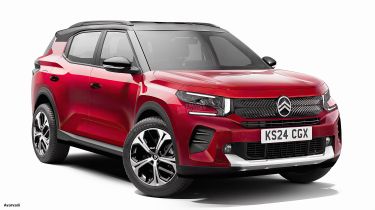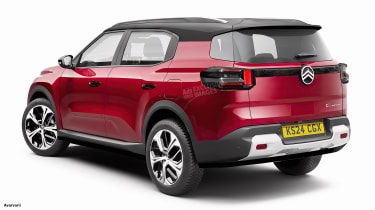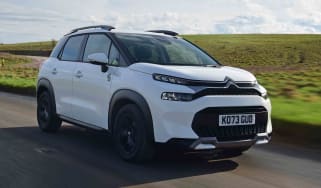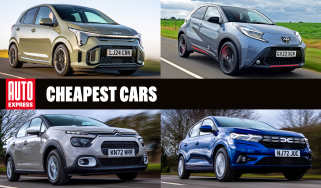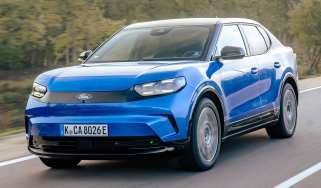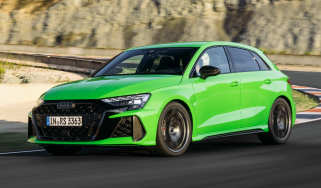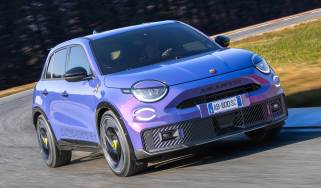Citroen C3 Aircross to morph into seven-seat Dacia Jogger rival
The next-generation Citroen C3 Aircross will put practicality first, but with a strong focus on value-for-money. Our exclusive images preview how it could look
Citroen has just launched the fourth generation of its C3 supermini – but the company has bigger, bolder plans for the forthcoming new C3 Aircross, which will count not only the Nissan Juke and Renault Captur as rivals, but also larger seven-seaters like the Dacia Jogger when it arrives next year.
The French brand has resharpened its focus on “affordable mobility for all” with the new C3 and e-C3, delivering a car that’s 25 per cent faster to make than the outgoing generation and likely to be priced from as little as £14,500 in base petrol spec. Clearly tasked with carrying parent group Stellantis’s fight to value king Dacia, Citroen will use the C3’s new ‘Smart Platform’ architecture and many of its build techniques with the second-generation C3 Aircross.
The firm teased the new SUV model at the recent launch of the C3, and revealed that it will be available with either five or seven seats. Speaking to Auto Express, Citroen’s Director of Product and Strategy Laurence Hansen said, “You will see the C3 Aircross early next year and you will see that there will be no question of the C3 and C3 Aircross competing against each other.”
Citroen’s head of design, Pierre LeClercq, admitted that the SUV influence on the C3 supermini (which sits around 10cm taller than most of its conventional rivals) has allowed his team to give the next C3 Aircross more of an overt off-roader look: “The next car is super-cool and we’re looking forward to presenting it,” he told us. “It’s a great family of products, in fact – really complimentary.”
Our exclusive images build on the teaser flashed on a screen during the C3’s launch event. They show how the C3 Aircross will feature the same near-vertical grille and headlight treatment, but with a taller bonnet line and a more chunky front bumper to give the car that rugged look. There’s also a longer rear overhang than we’ve seen on the existing C3 Aircross, to help accommodate the extra row of seats.
The next C3 Aircross will be offered with petrol, hybrid and full-electric powertrains, although Citroen may step up its entry-level petrol model from the C3 supermini’s base 74bhp normally aspirated unit, most likely to a turbocharged 99bhp 1.2 three-cylinder PureTech.
Above this, the Aircross could also be offered with a choice of hybrids – featuring either the same 99bhp unit or a 128bhp unit, paired up with Stellantis’s newly developed dual-clutch automatic gearbox, incorporating a 28bhp electric motor to boost fuel economy and allow spells of zero-emissions urban running.
The EV, meanwhile, will get the same 44kWh battery and 111bhp motor as the C3 – although Citroen may elect to use the Aircross’s longer wheelbase to offer a larger pack in due course.
Inside, it’s almost certain to feature the same dashboard layout as the C3, with all versions getting an ultra-slim instrument display, designed to be viewed above the steering wheel, and a 10-inch infotainment system.
The Smart Platform has its roots in the Indian market, although it does adopt some components from the CMP underpinnings used by the likes of the Vauxhall Corsa and Peugeot 208. It also incorporates significant modifications to both the front and rear crash structures to comply with tougher European legislation.
The architecture is flexible in lengths of front and rear overhangs, as well as wheelbase. Stellantis’s head of Smart Platform, Renaud Tourte, told us that the C3 is “towards zero” on the sliding scale. In fact it’s understood that up to seven cars will use the set-up, including Fiat’s forthcoming Panda, which would be the only model in the group shorter than the baby Citroen.
Tourte admitted that Smart Platform could conceivably support cars “at the smaller end of the C-segment”; this could mean that the C3 Aircross could stretch to beyond 4.4 metres in length, allowing the third row of occasional seats to give Citroen a rival for the Dacia Jogger, as well as the next-generation Dacia Duster.
Citroen’s push to make its smaller models more affordable means it is now adopting a similar approach to that of Dacia when it comes to safety – complying with regulations and aiming for good crash protection, but not necessarily asking customers to foot the bill for the electronic safety aids required to secure strong star ratings in the Euro NCAP test procedure.
On the topic, Laurence Hansen said: “When you ask a passenger car customer to talk about NCAP, they don’t care. It’s just for B2B clients to tick the box. So we are not running after stars; it’s no longer the story. The new C3 would be at the same level as the current C3; I don’t know, if you crashed a current C3 today, how many stars it would have. And I don’t care, because I know the car is safe.”
Click here for our list of the best SUVs on sale right now...

